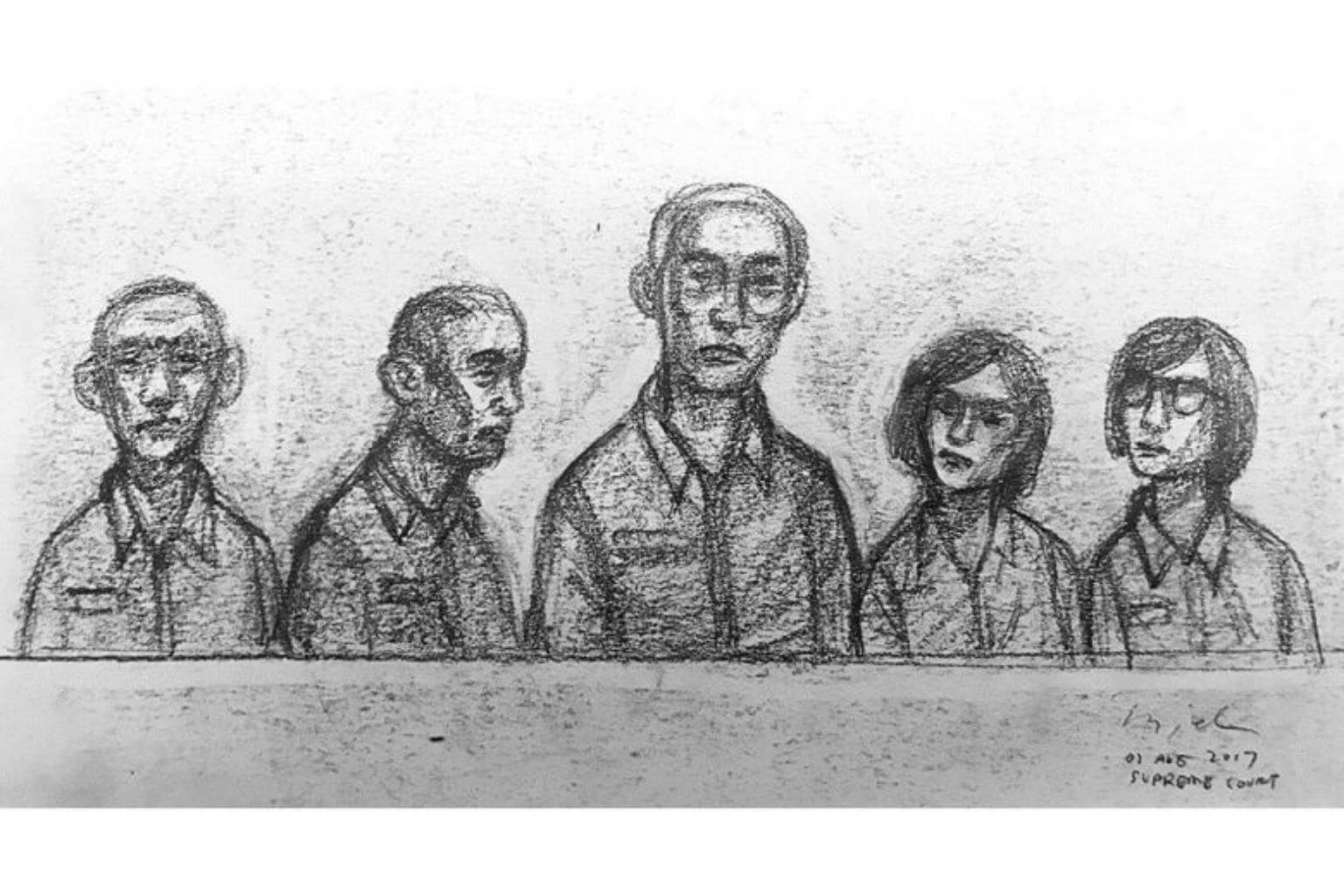City Harvest case: Court reserves judgment on interpretation of criminal breach of trust as agents
Sign up now: Get ST's newsletters delivered to your inbox

A sketch of the City Harvest church leaders during the hearing on Aug 1, 2017.
ST ILLUSTRATION: MIEL
Follow topic:
SINGAPORE - The Court of Appeal on Tuesday (Aug 1) reserved judgment on legal arguments raised by the prosecution that six City Harvest Church leaders who misused millions in church funds have been convicted under the wrong provision.
"This is an exercise in statutory interpretation," said Deputy Attorney-General Hri Kumar Nair, as the senior counsel launched into his submissions.
The prosecution's case is the six, including CHC founder Kong Hee, should be convicted of the more aggravated offence of criminal breach of trust (CBT) as "agents" under Section 409 of the Penal Code, which carries heavier punishments, rather than plain criminal breach of trust under Section 406.
The legal issue before the five-judge Court of Appeal is the interpretation of Section 409, in particular, whether company directors or the equivalent such as the six, should be convicted under the more serious punishments.
In April, the majority of a three-judge High Court panel cleared the six of CBT as agents and instead convicted them of plain CBT. As a result, their initial jail terms of between 21 months and eight years were reduced to between seven months and 3½ years.
Section 409 makes it an offence for a person who misappropriates property that is entrusted to him "in the way of his business as a banker, a merchant, a factor, a broker, an attorney or an agent".
But the majority ruled that the provision applies only to a "professional agent" who offers his services as an agent or makes his living as an agent; and directors such as the CHC six cannot be considered "agents".
In ruling that directors such as the six cannot be found guilty of CBT as agents, the court broke away from a legal position that has prevailed in Singapore for the past 40 years.
This has wider implications as it would affect how company directors who commit criminal breach of trust of company funds are prosecuted in the future.
The prosecution then applied for a rarely invoked criminal reference, to seek a definitive ruling from the Court of Appeal as well as to reinstate the original convictions under Section 409.
On Tuesday, Deputy Attorney-General Hri Kumar Nair argued that the court should set out all the possible interpretations of the law, look at the legislative purpose and then decide which interpretation advances the legislative purpose.
The senior counsel, who traced the legislative history of the provision back to 19th century English laws, said he agreed that Section 409 covers professional agents, but "that's not the only category that fits the bill", he said.
He argued that the thread running through banker, merchant, attorney and so on, is that not whether they are professional or offer services, but that these individuals of a higher order, with more responsibility and more confidence placed in them by the public, and therefore deserving of higher punishment.
"If that is the thread, then a director will fall nicely and squarely under that definition," he said.
Mr Nair said his interpretation will advance the legislative purpose of the provision.
He pointed out that the High Court majority agreed that their interpretation was "intuitively unsatisfactory" - that directors are punished less severely than employees.
To this, Justice Phang quipped: "They are experienced judges you know, more experienced than I am."
Senior Counsel Andre Maniam, the first defence lawyer to argue his case, also delved into legislative history. He argued that in England, the punishment for directors who commit CBT are lighter than that for clerks and servants.
He argued that if there was a lacuna, or a gap, in the law, it should be up to Parliament to make the amendments, and not for the court to make law.
The panel comprises Judges of Appeal Andrew Phang and Judith Prakash, and Justices Belinda Ang, Quentin Loh and Chua Lee Ming. The decision of the court is final.
In 2015, the CHC six were found guilty of CBT as agent, after a marathon trial, of misappropriating millions in church funds to fuel the pop music career of Kong's wife, Ms Ho Yeow Sun, in a church mission known as the Crossover Project.
They had channelled $24 million from CHC's building fund into sham bonds in music production company Xtron and glass-maker Firna. This money was in fact used to fund the Crossover Project. Later, another $26 million was used to cover up the initial misdeed.
Kong, 52, deputy senior pastor Tan Ye Peng, 44, former finance manager Serina Wee, 40, former finance committee member John Lam, 49, and former finance manager Sharon Tan, 41, who started serving their jail terms on April 21, appeared relaxed in court, with prison-issue haircuts and purple prison outfits. Former fund manager Chew Eng Han, 56, was allowed to suspend his sentence pending the outcome of the criminal reference.

